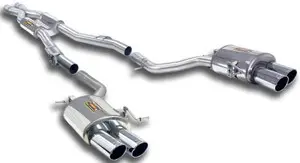
Winter against your exhaust system
Content
Your exhaust system plays a critical role in the overall performance and safety of your vehicle. When winter sets in, it's a good idea to exercise caution and watch out for potential exhaust damage due to icy road conditions. Keeping your exhaust system in good working order is critical to fuel efficiency, safety and the environment.
What does an exhaust system do?
The main purpose of the exhaust system is to remove exhaust gases from the engine and reduce their harmfulness. The exhaust system also reduces engine noise and ensures optimum engine performance.
The impact of winter on your exhaust system
Winter conditions can have several potential consequences for your exhaust system, including:
Destruction
Since the exhaust systems of most cars are located at the bottom, towards the rear, in winter conditions they can be damaged by pieces of ice, potholes, debris and large bumps.
Try to fix the pipe damage as soon as possible before the problem gets out of control, as driving a car with a damaged or low hanging exhaust will quickly aggravate the problem.
Water damage
Winter conditions make it more likely that water will damage your exhaust system. When water and exhaust gases combine, they form acids that can corrode stainless steel or the metal parts of your exhaust system. If you suspect water damage to the exhaust system, hire an experienced mechanic to check it out.
Exhaust inhalation
In winter, ice, snow or debris can get stuck in the exhaust system. When this happens, exhaust fumes can enter the passenger compartment, forcing occupants to inhale harmful fumes. These poisonous gases require immediate attention as they can cause serious problems.
You want to hire a qualified auto repair mechanic to check your vehicle's exhaust system for corrosion or damage to identify potential leaks.
Warm up in extra time
In cold weather, short trips take a toll on your exhaust system. When you drive a short distance, the car never gets hot enough to burn off the accumulated water vapor.
Water can eventually cause rust in your exhaust system. Always allow the engine enough time to warm up before driving.
Signs of a damaged exhaust system
Your vehicle's exhaust system will only work if it is properly maintained and serviced. Damaged exhaust system parts will affect your vehicle's sound/tone, performance and fuel economy.
Common signs that you have a damaged or faulty exhaust system include:
Excessive engine or exhaust noise
Any compromised part of your exhaust will make a loud or strange sound. Excessive noise or a distinct change in the tone of your exhaust is probably the most obvious sign of a bad exhaust. Higher sound levels can be caused by a cracked pipe, a leaking manifold gasket, or a rusty muffler.
Reduced fuel consumption
The significant reduction in fuel economy can be attributed to several factors, including inefficient exhaust emissions. A faulty exhaust makes your engine work harder, causing it to burn more fuel.
Slow acceleration
A leak somewhere in the exhaust can cause a delay in acceleration, especially when starting from a standstill. Sometimes the leak can be small enough not to make much noise.
strong gases
The smell of strong fumes from anywhere around your car probably means you have a leak in your exhaust system. Common culprits include damaged catalytic converters or pipe damage before the catalytic converter.
Other warning signs
Additional signs of a damaged exhaust system are:
- Defective engine
- Rust due to condensation
- Knocking under car
- Colored smoke
- Exhaust manifold leak
If any of these signs are present, it's time for an exhaust system repair or replacement. Depending on the problem, a technician may need to repair the exhaust pipes, catalytic converter, oxygen sensor, exhaust pipes, manifold, resonator, muffler, exhaust pipes, or EGR valves/sensors.
Preparation for winter
While it is almost impossible to control the weather and road conditions, the following proactive measures can help you keep your exhaust system running through the winter:
Wash your car
After a storm or diving on salty roads, wash your car or take it to a car wash for a thorough wash. Pay special attention to the undercarriage of the vehicle to avoid possible salt accumulation.
Avoid short trips
Short trips increase the chance that condensed water vapor will corrode your exhaust system from the inside out. Take longer trips to give your car a chance to remove moisture from the exhaust.
call us today
Need help with performance exhaust systems? Trust Performance Muffler for automotive exhaust industry expertise, from Cat-Back exhaust systems to high performance mufflers. Call us today at () 691-6494 to learn more about our services and discuss your needs.

